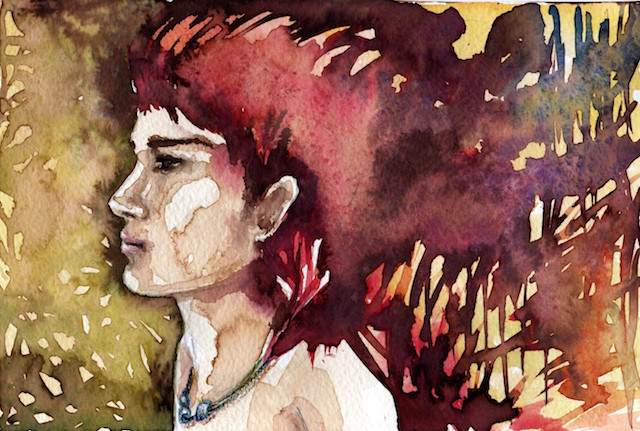
“Compassion is not a relationship between the healer and the wounded. It’s a relationship between equals.” ~Pema Chodron
In May 2012, I was appointed guardian and conservator of my father, and my brother was appointed co-guardian. Our father was declared mentally incompetent by the county court.
My father was, and is, an alcoholic. When I was growing up, he was an abusive alcoholic. He gave out wounds like gifts. He used words to cut us open, and then he threatened us with salt.
I lived in hypervigilance, and I learned that being alone, quiet, and invisible was the safest state of being. I was like a bottle—filled up with the wounds my father gave me as his bottles emptied.
And then I spilled.
In therapy, I learned how to heal. I learned how to give myself gifts that were actually gifts, how to love, how to grow, and how to move on.
Then, my father deteriorated. He was over sixty-five, and had been an alcoholic most of his life. He threatened to kill me, my brother, and my boyfriend.
He was having flashbacks from Vietnam. He was being abused by strangers who gave him alcohol and drugs and took his money.
He was hospitalized several times. He threatened to shoot himself. He started answering his door with a loaded gun. He left half-eaten roast beef sandwiches on my brother’s doorstep.
We exhausted our avenues before petitioning the court to declare him incompetent. Deciding to petition to become the legal guardian of a man who mistreated me, in order to protect him, was the hardest decision I’ve ever made.
I was trying to practice compassion, to treat him the opposite of how he treated me. I felt sorry for him.
He was an unhappy man, and instead of going to therapy or AA or changing, he drank. He threw his unhappiness at others. He built walls and imprisoned himself behind them. And he lost everything, even his mind.
It was hard not to feel sorry for a man who lost so much. In order to save what was left of his life, I went to court with my brother. Out of compassion. And out of hope that maybe something was left, and he could find, if not happiness, then peace.
If I could do this, I thought, if I could protect him and guard him from harm, then I am showing compassion.
I was wrong.
When we were in court, my aunt, my father’s sister, publicly denounced me and used my childhood abuse against me to prove that I was mentally unstable and unfit to care for my father. She lied about my relationship with my father, about my intentions to provide care, and about my student debt.
A woman who I had not seen in almost ten years, and who was never a close member of my family, proceeded to tell the court about child abuse that she never bothered to stop, in order to claim that I was irreparably damaged from it.
It was my nightmare made real.
I spent the next two years struggling to wake up. My father, whose brain was atrophied from drinking, became abusive again.
As he recovered rudimentary levels of functioning, he also lost his ability to “save face,” and in addition to abusing my brother and myself, he abused the staff at his nursing home and his fellow retirees.
He was threatened with expulsion on more than one occasion. Under the constant stress and constant abuse, I withered. I tried to stick with it, even though I felt my patience, my calm, my self-confidence, and my happiness eroding.
I wanted to try to help my father because he was my father. Because it was sad. Because he was sad. Because he was an addict. Because he made such terrible choices. Because I was trying to show compassion. But I had stopped showing compassion to myself.
When my mother was hospitalized with a brain aneurysm three weeks after having surgery for pancreatic cancer, I was petrified. I spent a month with her in the ICU while she was mostly unconscious, and at some point during that month, I began to realize that I couldn’t take care of everyone.
I watched her monitor beep and squiggle, and there was nothing that anyone, not me, not the nurses, not the neurosurgeons, could do but wait until they could operate.
As each day gathered together, I collected them into a gradual epiphany: I couldn’t take care of everyone. I most certainly couldn’t take care of anyone if I wasn’t already taking care of myself. And taking care of myself meant giving myself compassion.
When I volunteered to become my father’s guardian and conservator, I wanted to prove that I was healed enough to offer him compassion. I had wanted to stop being a person who was wounded, and who received help, and instead become a person who was healed and helping others.
But these two roles are not distinct. And sometimes they can be filled by the same person. It is possible to be both wounded and healing and healer and giver and receiver, all at the same time.
Compassion to the detriment of oneself is not compassionate. Compassion needs to begin with yourself. Compassion doesn’t prove anything, or judge anyone, or lift anyone.
Compassion is loving-kindness, a recognition that we are all the same, that we are beings trying to be, however we are. And that includes yourself.
I decided to be compassionate to myself, and I quit being my father’s guardian and conservator. My brother quit as well. My father now has a professional guardian tending to his needs, providing for his well-being, and handling his assets. And now I can tend to my own needs, and well-being, and assets.
Sometimes, despite our best intentions, our compassion toward others falls flat. In an unhealthy relationship, we may need to walk away and extend our kindheartedness, our helping, and most importantly, our compassion, to ourselves.
About V.E. Willis
V.E. Willis has written extensively about music and popular culture, but is currently pursuing writing creative non-fiction. When she’s not writing, she enjoys drinking coffee, running and CrossFit, and drinking more coffee. Most recently, her non-fiction essay about her father, “The Wheat from the Chaff,” was published in Eyedrum Periodically.


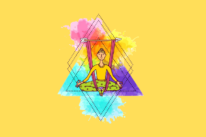




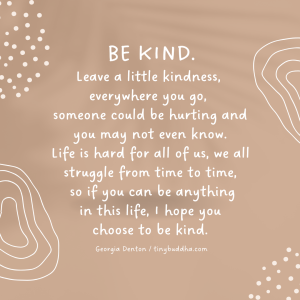



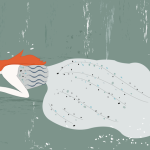
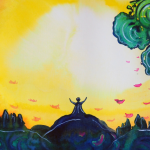
 Though I run this site, it is not mine. It's ours. It's not about me. It's about us. Your stories and your wisdom are just as meaningful as mine.
Though I run this site, it is not mine. It's ours. It's not about me. It's about us. Your stories and your wisdom are just as meaningful as mine. 
thank you for sharing!
Thanks for reading!! 🙂
Thank you for sharing your story. I myself am in a similar situation I have a sister and brother who are both alcoholics, my father was also a alcoholic and it took him to his grave at only 48.
Just recently I helped my brother get into treatment, it is a struggle but he is progressing. My sister on the other had is aggressive and manipulative and I choose to walk away from her, for 15 years I’ve fought to help her and save her. But only to realize that it is not my place to save her, instead I choose to save myself. For a long time I put everyone ahead of me trying to make things better for my family. But I never succeeded, all I did was neglect myself. I did choose a new path for myself and it is scary sometimes but I’m definitely a happier person now. I wish you happiness on your new path I know it’s a lot easier walking when all that weight is off your shoulders.
There are instances where some people just don’t want to be helped. When it is our own relative that makes it so much harder. God bless x
Thank you, V….this helps more than you can know.
So true, Anna!! Blessings to you, too!
Thank you, Mare. It IS scary–and strange to put myself first. I keep questioning myself, saying things like “is it selfish to do this? Or that?” So it’s DEFINITELY a process for me! But I am a lot happier now already. Rebuilding confidence just takes time, too. It’s strange how pervasive alcoholism is, and how celebrated alcohol is in America–I’ve met so many people with alcoholism in their families, or who are in recovery themselves. I’m glad your brother found treatment, and I’m very glad that you chose to save yourself! I hope your path brings you much happiness, too!!!
I’m glad, Lilly, and I wish you all the best!!
I really wish I was unable to say ‘I relate’ but I can’t. Last year at the age of 27 I finally came to the sad conclusion that my father needed me to walk away. After an entire lifetime of his emotional and psychological abuse, I finally had to let him be the mentally ill, alcoholic he appeared so desperate to become; he is now homeless somewhere in Spain and there is nothing I can, want or am able to do since he is unable to face his truth or help.
I have no idea what will happen to him or when he dies. He has no idea that I have moved to Australia or that, at the time of discovering he was homeless, was recovering from an illness myself. After 2 years of suffering a nervous breakdown, I barely had the energy to look after myself never mind someone who didn’t want or deserve it.
So thank you for showing that sometimes, no matter what society says, you just can’t help everyone.
I hope you continue to be kind to yourself V in whatever capacity you need it.
Toni
Hi V, I am glad you are doing better. It is hard to see a loved one suffer. Naturally, we want to help out. Especially if we are empathetic. I too was being a care taker to my loved ones and forgot about myself. I am still facing the consequences, like you. There comes a point where you can no longer drown with the person. I am there for them to a limit, a healthy one. That’s all I can do. We can’t fix everyone. As family members it is easy to feel guilty for not helping, don’t let that get to you. I am saying this from experience. You are just one person and you are a human being. You have emotions. Take care and I wish you the best. <3
V. I think you have a lot of healing left to do… no one can live through the abuse you’ve been through and just “walk away”… there is bound to be a lot of anger and rage inside. You also sound young. It’s going to take years to get your head (and heart) around all of this. I recommend that you read books, join Al-Anon, and do some serious emotional work like the Hoffman Process of Path of Love.
People in this situation (I come from a similar one) tend to become co-dependent. Putting others needs before their own. It’s good to have compassion for yourself first and foremost. Thanks for sharing.
Brave V!
I feel so sorry for all the unhappiness that you’ve been surrounded with. I hope you are happy or at least at peace now. My dad struggled with alcohol and was a war veteran also. I love him still, and I don’t think that I had to live theough as much turmoil as he gave my mother or sisters, but I can definitely relate to your story. I find myself wanting to be the one who helps people in their lives also, to heal people, or take some responsibility. I enjoyed reading your story and relating to it.
V … you did and are doing the right thing. Congratulations and best wishes. I often make the argument with people that their #1 priority should be to take care of themselves first. I always get the response of what a selfish philosophy that is. But when I point out that if they don’t do that, then they will not be able to take care of anyone else and they will have to have someone take care of them. It all boils down to personal responsibility. No wonder I am a diehard libertarian eh.
Vjk
I’m sorry that you have alcoholism in your family, too, but I’m glad that you chose to take care of yourself! What a heart-wrenching story you have–it’s always hard. And it’s so true–you can’t help everyone. People have to want help; they have to help themselves! Addiction is such a terrible disease–and so many people have stories of overcoming or family members overcoming it, and it’s hard when it’s your family member that isn’t a “success” story. But I think that when we stop hurting ourselves for the sake of trying to “save” others, and we choose to save ourselves instead–THAT is the success story!!I hope that you continue to be kind to yourself (and continue making your own success story), too!!
Thank you, Peace Within! It’s definitely a learning process–trying to let go and take care of myself, not just first, but at all! But taking it one step at a time helps. Thanks for your encouragement, and I wish you all the best, too!
Carrie, you are so right! I read A LOT of books, do yoga and meditation, attend therapy as needed, and have been to Al-Anon (but I’m not a regular attendee). I think that healing is a process, and that recovery is a lifestyle. I have never heard of the Hoffman Process of Path of Love, however, and I’m going to check that out asap!! Thanks for the tip!!!
Maya, I agree. I read several books that discussed co-dependency (mostly in terms of abuse and alcoholism) before learning that was probably part of the unhealthy relationship dynamic that I was in. And that if anyone was going to change it, it would have to be me. Thanks for the encouragement to keep compassion directed at oneself, first!!
Thanks, JeGe21!! I don’t feel very brave most of the time, so I really appreciate this comment!! =)
Thank you, Tim! I definitely feel happier, but I think it’s a process–getting to place of peace and happiness. I’ll continue to heal for a while yet, but I feel like a huge weight has been lifted. And I finally have the time to start paying attention to myself, and figuring out what I want my life to look like, instead of warping my life into what someone else wants it to look like. It’s wonderful. =) I hope that you are being compassionate to yourself, too!!
Thank you, Vjk. I think the libertarian philosophy definitely applies here! I’m working on making your argument into my reality. Thanks for support!!
I applaud you for writing about this publicly. I have a story that is similar but it is my mother who is the verbal abuser. My two brothers moved out of state and the abuses towards me got so bad I had to try to obtain a restraining order. Now the family is accusing me of being the perpetrator. It is a very difficult situation. Someone once said to me this is a gift. As the story unfolds I continue to try and remain in the present, looking beyond the appearances. There are so many lessons. One interesting lesson in this lifetime for me is to be aware and lovingly unattached. Continue to be strong V…
This article is excellent and I agree. Nice quote to use and am sorry you had to endure that but glad you did so you can learn from that for you and to share it with the rest of us. I can surely relate. Peace.
Thank you, K. Your story reminds me of what someone once said to me, that they wouldn’t change anything about my past, because then I wouldn’t be who I am today. In a way, it is a gift, I think. Gregory Orr, a poet, has a memoir called The Blessing that is a very powerful book. I enjoyed it–maybe you will too. I wish you all the best, K, and continued strength to you, too!
Thank you, Susan Marie! That means a lot to me!! I was actually just commenting about someone telling me something similar in another time and place. It’s important to remember that we are molded into who we are, and who we are is invaluable in so many ways!! Peace and best wishes to you, too!
You are welcome. Yes we are and many people would not have already gone through the healing process in order to write this. I applaud you.
This is a really wonderful post. My psychologist twigged me to it. Thank you so much!
Thank you, Kaitlyn!! I really appreciate your kind words (and your use of “twigged,” which is awesome)!! =)
just as Aaron explained I’m impressed that people able to profit $5846 in a few weeks on the computer . look at more info x.vu/TP1V8l
Thank you for sharing. I’m struggling with leaving my second alcoholic live in boy friend. This is my second time as the heroine in this love story, but not my first time dealing with addicts. I have an addict mother as well. I’ve been able to understand that leaving him is the best thing I can do for myself and my children. I did the same thing with my mother. I distanced myself from her because she was neglectful. After many bad black out drunk episodes on his part, this realization was clear and came after one short year of many wrongs that I have to distance myself from him. I couldn’t however understand why I had allowed my situation to repeat. Why hadn’t I learned my lesson the first time? The answer I came to is two sided- first my addict mother has trained my brain to have an abnormal amount of apathy for addicts and a misconception that I can save them. Second. I didn’t see the signs. Even though, they had been clear a few months into our living arrangement, I wanted so bad to be with this man. I had loved and known him for years. I put all second guesses on the back burner and let myself go with it. I’m still trying to walk away but what I have learned is to keep putting myself first even after the dopamine kicks in.
Hi, Nicole! In my experience, I’ve had to learn all my lessons two or three times. The good thing about that is that it gave me the opportunity to DEEPLY absorb the lesson. If you’ve never been to Al-anon, I’d suggest giving it a whirl. It was really beneficial to me because it showed me the coping strategies that other people used to deal with the addicts in their lives. It also let me meet other people who walked away, and not only survived walking away, but thrived after walking away. That helped me tremendously. And remember to have faith in yourself. It takes effort and work to walk away, but you can get there!
Anyone consider veterans affairs? They have in paitent programs and addict programs that would probably be free for him depending on his disability compensation which he would need help applying for if he doesn’t already have it.
Wow, you are extremely strong even in the face of Goin through so much. You are here sharing your story and being an inspiration. We all come to see the difference between selfishness and self love in our own time. I am glad you are choosing self love and that you are taking care of yourself. Taking care of yourself alone makes the world heal. Blessings and love to you.
Thanks, dg! I actually tried that, too, but they wouldn’t take him for inpatient–he was “too young” (at the time he was 69). And he wouldn’t go to any of the rehab programs, which need to be voluntary. Plus, my dad refused to activate any of his VA benefits, and he even stated in court that he didn’t want any help from the VA. Even the judge was really surprised. I’ve talked to several folks at the VA, both regionally and nationally, and they’ve all been really wonderful though.
Thank you, Angel. I really appreciate your kind words. It means more than I can say to have such support and validation. Blessings and love to you, too!!
Exact same situation.
Light, love and immense strength to you. <3
Thanks, Snowflake!! I’m sorry to hear that you’ve got the same difficulties, and I’m sending lots of positive and healing thoughts your way. Light, love, and immense strength to you, too!!! <3
Thank you for sharing article. It really touched my heart!
I’m glad it touched your heart, Jahnvi! That means a lot to me! <3
It is important to protect your self first , some times it’s best solution for everything thing in your life.Stay strong and let others to take responsibility for there life’s ,especially some how not deserve your kindness.
You are so right, Marcin. And thank you!